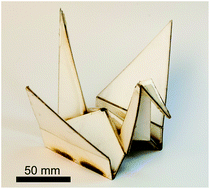Origami-inspired manufacturing can produce complex structures and machines by folding two-dimensional composites into three-dimensional structures. This fabrication technique is potentially less expensive, faster, and easier to transport than more traditional machining methods, including 3-D printing. Self-folding enhances this method by minimizing the manual labor involved in folding, allowing for complex geometries and enabling remote or automated assembly. This paper demonstrates a novel method of self-folding hinges using shape memory polymers (SMPs), paper, and resistive circuits to achieve localized and individually addressable folding at low cost. A model for the torque exerted by these composites was developed and validated against experimental data, in order to determine design rules for selecting materials and designing hinges. Torque was shown to increase with SMP thickness, resistive circuit width, and supplied electrical current. This technique was shown to be capable of complex geometries, as well as locking assemblies with sequential folds. Its functionality and low cost make it an ideal basis for a new type of printable manufacturing based on two-dimensional fabrication techniques.

You have access to this article
 Please wait while we load your content...
Something went wrong. Try again?
Please wait while we load your content...
Something went wrong. Try again?


 Please wait while we load your content...
Please wait while we load your content...